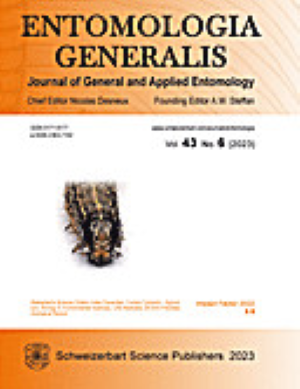Repellent and insecticidal effects of Rosmarinus officinalis and its volatiles on Tuta absoluta
IF 4.6
1区 农林科学
Q1 ENTOMOLOGY
引用次数: 0
Abstract
Tomato leaf miner (Tuta absoluta) is a notoriously invasive pest that has spread from South America to over 110 countries worldwide and poses a significant threat to the global tomato industry. Adverse effects associated with the overuse of chemical insecticides have prompted researchers to seek ecologically-based management options, such as using secondary plants. However, research on the repellent plants of T. absoluta is missing. In this study, we assessed the potential of nine commonly reported repellent plants. Rosmarinus officinalis was found to exhibit a significant repellent effect against T. absoluta. We quantified the volatile organic compounds (VOCs) in R. officinalis, and further determined the repellent effects of the specific VOCs. The plant R. officinalis and the VOC eucalyptol delayed the developmental period of T. absoluta and decreased the egg-hatching rate. By running cage and greenhouse experiments, we confirmed that R. officinalis and eucalyptol reduced the damage caused by T. absoluta via antixenosis (i.e. reduced number of eggs laid). Our results showed the important function of R. officinalis and its VOCs in controlling T. absoluta, guiding the use of repellent plants as a key component of Integrated Pest Management packages.迷迭香及其挥发物对 Tuta absoluta 的驱虫和杀虫作用
番茄潜叶蝇(Tuta absoluta)是一种臭名昭著的入侵害虫,已从南美洲蔓延到全球 110 多个国家,对全球番茄产业构成了重大威胁。与过度使用化学杀虫剂相关的不利影响促使研究人员寻求基于生态的管理方案,如使用次生植物。然而,关于 T. absoluta 的驱虫植物的研究尚属空白。在这项研究中,我们评估了九种常见驱虫植物的潜力。结果发现,迷迭香对 T. absoluta 有明显的驱避效果。我们对迷迭香中的挥发性有机化合物(VOCs)进行了量化,并进一步确定了特定 VOCs 的驱虫效果。植物 R. officinalis 和挥发性有机化合物桉叶油醇能延缓 T. absoluta 的发育期并降低其卵孵化率。通过笼养和温室实验,我们证实 R. officinalis 和桉叶油醇能通过抗败血病(即产卵数量减少)来减少 T. absoluta 的危害。我们的研究结果表明了 R. officinalis 及其挥发性有机化合物在控制 T. absoluta 方面的重要功能,这为将驱虫植物作为虫害综合防治方案的关键组成部分提供了指导。
本文章由计算机程序翻译,如有差异,请以英文原文为准。
求助全文
约1分钟内获得全文
求助全文
来源期刊

Entomologia Generalis
生物-昆虫学
CiteScore
7.10
自引率
18.80%
发文量
72
审稿时长
>12 weeks
期刊介绍:
Its scope covers all aspects of basic and applied research dealing with insects and more broadly with arthropods inhabiting wild, agricultural and/or urban habitats. The journal also considers research integrating various disciplines and issues within the broad field of entomology and ecology.
Entomologia Generalis publishes high quality research articles on advances in knowledge on the ecology and biology of arthropods, as well as on their importance for key ecosystems services, e.g. as biological control and pollination. The journal devotes special attention to contributions providing significant advances (i) on the fundamental knowledge and on sustainable control strategies of arthropod pests (including of stored products) and vectors of diseases, (ii) on the biology and ecology of beneficial arthropods, (iii) on the spread and impact of invasive pests, and (iv) on potential side effects of pest management methods.
Entomologia Generalis welcomes review articles on significant developments in the field of entomology. These are usually invited by the editorial board, but proposals may be sent to the Editor-in-Chief for preliminary assessment by the editorial board before formal submission to the journal. The journal also considers comments on papers published in Entomologia Generalis, as well as short notes on topics that are of broader interest.
 求助内容:
求助内容: 应助结果提醒方式:
应助结果提醒方式:


